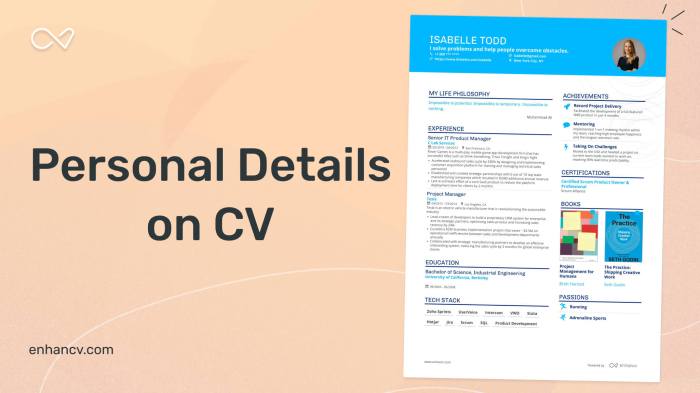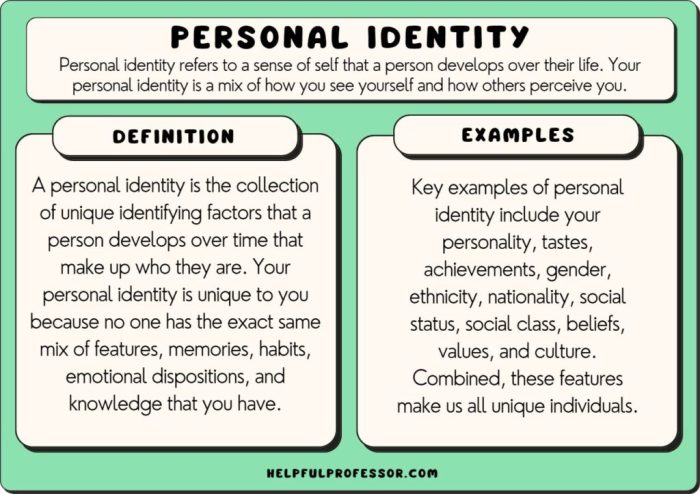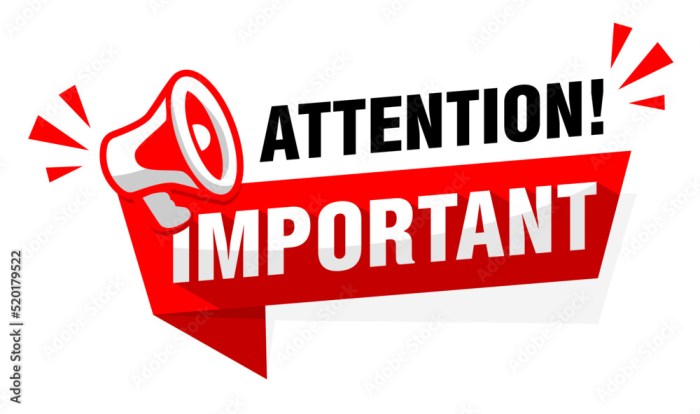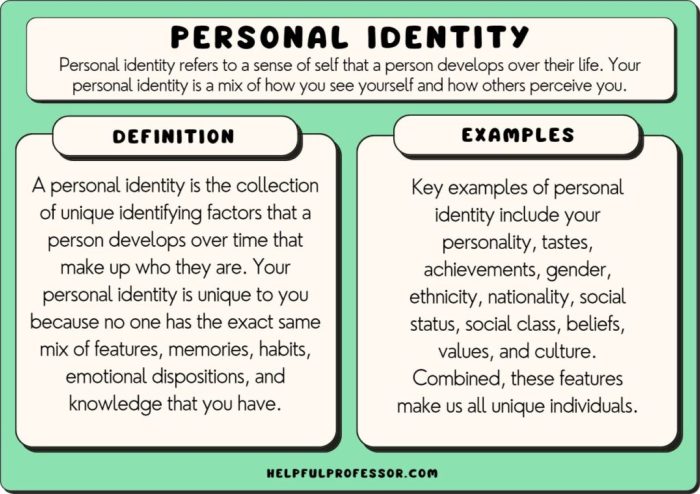What is personal branding? It’s about crafting a unique and compelling narrative that showcases your skills, experience, and values to the world. This isn’t just about a resume; it’s about building a recognizable and respected identity that resonates with your target audience. Think of it as your professional story, told in a way that attracts opportunities and builds lasting relationships.
This comprehensive guide delves into the multifaceted world of personal branding, exploring everything from defining your brand to maintaining and evolving it over time. We’ll cover strategies for different career stages and industries, providing practical advice and actionable steps you can implement immediately. Get ready to learn how to effectively communicate your brand online and offline, and understand the importance of consistency and continuous development in this dynamic field.
Defining Personal Branding
Personal branding is more than just a fancy term; it’s a crucial aspect of navigating today’s professional landscape. It’s the intentional cultivation of a public image that reflects your unique skills, values, and aspirations. A strong personal brand differentiates you from the competition and helps you stand out in a crowded marketplace, both online and offline. It’s about shaping how others perceive you and leveraging that perception to achieve your professional and personal goals.A well-defined personal brand is built on a foundation of self-awareness.
It involves understanding your strengths, passions, and unique contributions. This understanding allows you to craft a compelling narrative that resonates with your target audience. This process isn’t about creating a false persona; rather, it’s about highlighting the authentic qualities that make you valuable.
Defining Personal Branding
Personal branding is the deliberate process of creating and shaping a public image that represents your unique value proposition in the professional world. It’s about consciously crafting a narrative that showcases your skills, experiences, and personality to establish a strong, recognizable identity. A strong personal brand is characterized by consistency, authenticity, and strategic communication.
Key Components of a Strong Personal Brand
A strong personal brand is multifaceted. It’s not just about your LinkedIn profile or a catchy tagline. Crucial components include:
- Clear Value Proposition: What unique value do you offer to potential employers, clients, or collaborators? Highlighting your expertise and the problems you solve is key.
- Authenticity: Your personal brand should reflect your true self. Faking it won’t last, and it won’t resonate with those who matter most.
- Consistency: Maintaining a consistent message across all platforms—from your website to your social media presence—is essential to building recognition and trust.
- Visual Identity: A professional headshot, a unique logo, and consistent color schemes can significantly enhance your personal brand’s visual appeal and memorability.
- Networking Skills: Connecting with people in your industry and building genuine relationships is crucial for establishing your brand and expanding your professional network.
Personal Branding vs. Professional Resume
While both personal branding and a professional resume are essential for career advancement, they serve different purposes. A resume is a factual document showcasing your qualifications and accomplishments. A personal brand, on the other hand, is a narrative that connects those qualifications and accomplishments to your unique personality and values.A resume lists your experience; a personal brand tells the story of how you used that experience to achieve your goals.
A personal brand is a strategic approach to positioning yourself in the market. A resume is a tool for applying for specific roles.
Examples of Successful Personal Brands
Many successful individuals have built powerful personal brands across various industries. Examples include:
- Elon Musk: His personal brand is built on innovation, disruption, and a bold vision for the future.
- Gary Vaynerchuk: His brand focuses on authenticity, entrepreneurship, and direct communication with his audience.
- Michelle Obama: Her brand emphasizes empowerment, health, and family values.
- Sheryl Sandberg: Her brand champions leadership, female empowerment, and work-life balance.
Comparing Approaches to Personal Branding
Different individuals employ various strategies for building their personal brands. The following table highlights some key distinctions:
| Approach | Focus | Strengths | Weaknesses |
|---|---|---|---|
| Content Marketing | Creating valuable content (blog posts, articles, videos) to establish expertise and thought leadership. | Builds credibility, attracts a targeted audience, establishes thought leadership. | Requires consistent effort and time investment; may not yield immediate results. |
| Social Media Engagement | Building a strong online presence on platforms like LinkedIn, Twitter, and Instagram. | Enhances visibility, facilitates networking, allows for direct engagement with the audience. | Requires active management and can be time-consuming; vulnerable to negative feedback or criticism. |
| Public Speaking | Presenting at conferences, workshops, or webinars to share expertise and build influence. | Builds credibility and presence; allows for direct interaction with the audience. | Requires preparation and confidence; may not reach as wide an audience as online platforms. |
Building a Personal Brand
Crafting a compelling personal brand is more than just creating a fancy logo or a snazzy website. It’s about strategically communicating your unique value proposition to the world. It’s a continuous process of self-discovery, refinement, and consistent action, ultimately leading to increased visibility and opportunities. A strong personal brand can open doors to new collaborations, career advancement, and even personal fulfillment.A well-defined personal brand isn’t about trying to be someone you’re not; instead, it’s about highlighting your strengths, passions, and expertise to attract the right connections and opportunities.
It’s about understanding your unique value proposition and strategically communicating it to your target audience.
Personal branding is essentially about crafting a unique identity that reflects your skills and values. It’s not just about a fancy logo; it’s about showcasing your authentic self. When you begin accepting yourself, as outlined in this insightful article on when you begin accept yourself these 10 amazing things will happen , your confidence shines through.
This self-acceptance becomes a powerful foundation for building a strong and genuine personal brand.
Crafting a Personal Brand Strategy
A robust personal brand strategy requires careful planning and execution. It involves understanding your target audience, defining your unique value proposition, and consistently communicating that message across various platforms. This strategy should be adaptable and refined as your goals and aspirations evolve.
Self-Assessment in Personal Branding
Thorough self-assessment is crucial to building a strong personal brand. It involves introspective analysis of your skills, experience, values, and passions. This process should identify your strengths and areas for development. Honest self-reflection allows you to create a brand that authentically represents you. This includes identifying your unique strengths and talents, and understanding how they can benefit others.
Identifying Your Target Audience
Understanding your target audience is fundamental to effective personal branding. Identify the individuals or groups who are most likely to benefit from your skills and expertise. Consider their needs, interests, and online behaviors to tailor your brand messaging and platform presence accordingly. Researching your target audience’s online presence and engagement patterns will help you tailor your content and interactions.
This understanding allows for strategic targeting of the right individuals and organizations.
Personal branding is essentially crafting a unique identity online and offline. It’s about showcasing your skills and values to attract opportunities. However, sometimes we get caught up in material possessions, thinking they’ll bring happiness, which often doesn’t happen. Check out this insightful article exploring 7 reasons why you might be materialistic without realizing it’s not bringing you happiness 7 reasons why youre materialistic when doesnt make you happier.
Ultimately, strong personal branding is about more than just the latest gadgets; it’s about genuine connection and showcasing your unique strengths.
Storytelling in Personal Branding
Storytelling is a powerful tool for connecting with your audience on a personal level. Sharing anecdotes and experiences that showcase your journey and personality builds trust and credibility. These stories should highlight your values, passions, and the impact you’ve made. Your stories should be genuine and relevant to your audience. Use storytelling to create an emotional connection, and demonstrate the value you bring.
Personal Branding Exercises
Several exercises can help you gain clarity about your personal brand. These exercises should be tailored to your specific needs and goals. A simple exercise is to write a short bio highlighting your skills and experience. Other exercises include creating a “personal brand statement” – a concise description of your unique value proposition – or conducting a SWOT analysis (Strengths, Weaknesses, Opportunities, Threats) to identify areas for improvement.
Developing a strong brand narrative through stories and anecdotes is key to showcasing your personality and value proposition.
Showcasing Skills and Experience
Demonstrating your skills and experience is essential for establishing credibility. Share examples of your accomplishments, using quantifiable results whenever possible. Highlight your contributions and achievements to showcase your impact. Use a portfolio website or social media to showcase your work. Showcase your work samples to effectively demonstrate your skillset and experience.
Personal branding is essentially about crafting a unique image for yourself. It’s about showcasing your skills and values to attract opportunities, much like how a company might build its brand to attract customers. Want to take control of your finances? Check out these 10 ways to become debt free quickly, which will inevitably boost your confidence and help you present yourself better 10 ways become debt free quickly.
Strong financial footing forms a solid foundation for a strong personal brand, demonstrating reliability and resourcefulness.
Platforms for Personal Branding
| Platform | Description | Benefits |
|---|---|---|
| Professional networking platform | Excellent for building connections with professionals in your field, showcasing expertise, and increasing visibility. | |
| Microblogging platform | Ideal for sharing thoughts, insights, and updates in a concise manner, and engaging with a wider audience. | |
| Visual-centric platform | Perfect for showcasing projects, expertise, and personality through images and videos, potentially attracting a creative or visual audience. | |
| Personal Website | Dedicated online space | Provides a central hub for showcasing your expertise, experience, and portfolio. Excellent for presenting a comprehensive overview of your work. |
| Medium/Blogs | Article-sharing platform | Great for establishing yourself as an expert by sharing insightful content and establishing thought leadership. |
Communicating Your Brand
Your personal brand isn’t just a collection of ideas; it’s a story you tell, both online and offline. Effective communication is the key to bringing that story to life and making your brand resonate with your target audience. It’s how you project your values, expertise, and unique personality to build trust and credibility.Communication plays a crucial role in personal branding.
It’s the bridge that connects your aspirations with the audience you wish to influence. A strong communication strategy reinforces your brand’s identity, creating a lasting impression that goes beyond a single interaction. Consistent and targeted communication helps establish your authority and builds lasting relationships with potential clients, collaborators, and mentors.
The Power of Online Communication, What is personal branding
Online platforms have revolutionized how we connect and share information. For personal branding, online presence is paramount. It’s where you showcase your expertise, build relationships, and engage with your target audience. Platforms like LinkedIn, Twitter, and Instagram offer diverse opportunities for expressing your brand identity and connecting with potential opportunities. Effective online communication involves understanding your target audience and crafting messages that resonate with them.
Crafting Your Offline Presence
While online presence is essential, your offline interactions still hold immense value. Networking events, presentations, and even casual conversations provide chances to showcase your brand’s personality and values in real-life settings. In these instances, your demeanor, communication style, and overall approach shape your brand’s image in the minds of those you interact with.
Consistency in Your Message
A consistent brand message across all platforms builds trust and reinforces your unique identity. Inconsistency creates confusion and dilutes the impact of your brand. Regardless of the platform, ensure your brand’s core values, mission, and personality remain visible and consistent. This consistent approach builds recognition and fosters trust among your audience.
Effective Communication Strategies
Effective personal branding communication strategies involve tailoring your message to your target audience. Sharing insightful articles, engaging in thought-provoking discussions, and participating in industry events are all ways to demonstrate expertise and build your brand’s authority. Using storytelling in your communication is a powerful technique. Personal anecdotes, case studies, and narratives can make your message relatable and memorable.
Best Practices for Online Communication
- Develop a consistent brand voice and tone. This includes using a specific vocabulary, writing style, and tone that aligns with your brand’s personality.
- Engage with your audience. Responding to comments, questions, and messages shows that you value your audience and fosters a sense of community.
- Use high-quality visuals. Images and videos can enhance your message and make it more engaging.
- Optimize for different platforms. Tailor your content to the specific features and style of each platform you use.
- Track your results. Monitor your engagement metrics to understand what’s working and what needs improvement.
Content Formats for Personal Branding
Different content formats cater to diverse audiences and preferences. Understanding which format best suits your message is crucial for effective communication.
| Content Format | Description | Example |
|---|---|---|
| Blog Posts | In-depth articles that showcase expertise and thought leadership. | A personal finance blog post discussing strategies for saving money. |
| Social Media Posts | Short, engaging updates that promote interaction and visibility. | A LinkedIn post sharing industry insights or a Twitter thread on a trending topic. |
| Videos | Visually engaging content that allows for a more personal connection with the audience. | A YouTube video discussing a specific skill or a short Instagram Reel showcasing a project. |
| Podcasts | Audio-based content that can be consumed on the go, providing a more intimate feel. | A podcast interview with a prominent figure in the industry. |
| Infographics | Visual representations of data or information that simplify complex concepts. | An infographic showcasing the benefits of a particular career path. |
Maintaining and Evolving Your Brand

A strong personal brand is not a static entity; it’s a dynamic representation of your skills, values, and aspirations. Maintaining consistency is crucial for building trust and recognition, but equally important is the ability to adapt and evolve as you grow and change. This continuous evolution ensures your brand remains relevant and resonates with your target audience throughout your career journey.Consistent personal branding fosters recognition and credibility.
A clear and consistent message builds trust with potential employers, collaborators, and clients. This trust is essential for securing opportunities and building long-term relationships. The stability and predictability of a well-maintained brand signals reliability and competence.
Importance of Consistent Branding
Maintaining consistency in your personal brand is akin to maintaining a professional image. It involves aligning your online presence (social media, website, etc.) with your offline interactions and communications. A consistent brand reinforces your professionalism and builds trust with others, conveying reliability and dependability. This consistency is especially valuable in today’s interconnected world, where first impressions are often formed online.
Adapting and Evolving Your Brand
Personal branding is not a one-time project; it’s a continuous process. As you gain new skills, experience different roles, or discover new passions, your brand needs to evolve accordingly. Adaptability ensures your brand remains relevant and resonates with your target audience. This adaptability demonstrates a commitment to growth and learning, which is attractive to employers and collaborators.
Continuous Learning and Development
Continuous learning and development are integral to maintaining and evolving a strong personal brand. Staying updated with industry trends, acquiring new skills, and embracing lifelong learning demonstrates your commitment to professional growth. This proactive approach showcases your dedication to excellence and positions you as a valuable asset to any team or organization.
Examples of Brand Adaptation for Career Changes
Many individuals have successfully adapted their personal brands for career changes. A software engineer, for instance, might pivot to a leadership role. To do this effectively, they might highlight their project management skills and leadership experience alongside their technical expertise. Similarly, a graphic designer who wants to transition to a marketing role might emphasize their communication skills and understanding of marketing principles.
Strategies for Monitoring and Measuring Brand Effectiveness
Monitoring and measuring the effectiveness of your personal brand is essential for identifying areas needing improvement and ensuring your brand remains relevant. These strategies include:
- Tracking social media engagement (likes, shares, comments): Analyzing engagement metrics provides insights into audience reception and allows for adjustments in content and messaging.
- Analyzing website traffic and analytics: Website analytics reveal how people are interacting with your online presence, providing valuable feedback on content effectiveness.
- Seeking feedback from mentors, peers, and clients: Constructive criticism from trusted sources can offer valuable insights into how others perceive your brand.
- Monitoring media mentions and online reviews: Staying aware of how you’re being discussed online helps you identify potential areas for improvement.
Crisis Management Plan
A crisis can damage a personal brand. A well-defined plan is crucial for mitigating potential harm and regaining trust.
| Crisis Stage | Action Steps |
|---|---|
| Pre-Crisis | Develop a crisis communication plan, identify potential risks, and establish a support network. |
| Crisis Event | Acknowledge the issue promptly, take responsibility where appropriate, and provide transparent communication. |
| Post-Crisis | Address the fallout, learn from the experience, and demonstrate commitment to recovery and improvement. |
Personal Branding in Different Contexts
Personal branding is no longer a luxury, but a necessity in today’s competitive job market. Understanding how to tailor your personal brand to different contexts is crucial for success, whether you’re a student navigating college life or a seasoned executive navigating industry shifts. This exploration dives into how personal branding adapts across various career stages, industries, and professional roles.
Personal Branding Across Career Stages
Different career stages demand different approaches to personal branding. A student’s brand focuses on building a foundation of skills and experience, while an early career professional emphasizes showcasing initial accomplishments and industry knowledge. Mid-career professionals may emphasize leadership qualities and expertise in their field, while senior professionals leverage their experience to guide and mentor. This adaptation ensures your brand remains relevant and impactful throughout your professional journey.
- Student: Focus on developing a portfolio of skills and experiences, showcasing extracurricular activities, academic achievements, and personal projects. Networking is key, building connections with professors, mentors, and peers. Demonstrate initiative and a strong work ethic. Utilize online platforms like LinkedIn and personal websites to showcase your accomplishments.
- Early Career Professional: Emphasize early successes, internships, volunteer work, and projects that demonstrate skill mastery. Showcase soft skills like communication and teamwork. Actively participate in industry events and network with professionals. Highlight skills relevant to the job market and demonstrate initiative and a strong work ethic. Demonstrate learning agility.
- Mid-Career Professional: Showcase leadership experience, expertise, and accomplishments in your field. Focus on building thought leadership through articles, presentations, or speaking engagements. Network with industry influencers and mentors. Highlight mentoring activities, and contributions to projects.
- Senior Professional: Leverage extensive experience to provide mentorship and guidance. Establish yourself as a thought leader by publishing articles or books, presenting at conferences, and offering industry expertise. Position yourself as a valuable resource for younger professionals. Focus on industry recognition and contribution.
Personal Branding Across Industries
The application of personal branding differs significantly based on industry. A tech professional may focus on technical skills and innovation, while a finance professional might emphasize financial acumen and market knowledge. Artistic professionals may focus on showcasing their unique style and creative process. Tailoring your brand to the specific expectations and values of each industry is essential.
- Technology: Showcase technical skills, coding proficiency, project management experience, and problem-solving abilities. Highlight contributions to open-source projects and participation in tech communities. Demonstrate a proactive approach to learning new technologies and adapting to industry trends. Examples include GitHub profiles, blog posts, and presentations.
- Finance: Emphasize financial knowledge, market analysis skills, and investment strategies. Highlight experience in financial modeling, portfolio management, and risk assessment. Showcase leadership and teamwork abilities. Demonstrate a deep understanding of financial markets.
- Arts: Showcase your unique style, creative process, and artistic vision. Create a portfolio that highlights your best work. Promote your work through online platforms and social media, and engage with the art community. Emphasize artistic expression and originality.
- Education: Demonstrate teaching experience, educational philosophy, and curriculum development skills. Share insights into pedagogical approaches and educational innovation. Showcase leadership qualities and a commitment to student success. Demonstrate a deep understanding of the field.
Personal Branding for Freelancers vs. Employees
Freelancers and employees approach personal branding differently. Freelancers use it to attract clients and establish themselves as experts in their field. Employees use it to advance within their company and highlight skills valuable to their organization. While both strategies focus on building credibility, their approaches to communication and presentation differ significantly.
- Freelancers: Highlight expertise, unique skills, and proven success through case studies and client testimonials. Build a professional website or online portfolio to showcase their work and demonstrate their ability to solve client problems. Network actively with potential clients through industry events and online communities. Build a reputation for excellence.
- Employees: Showcase skills and achievements that align with company goals. Network internally to build relationships with colleagues and mentors. Demonstrate initiative and a commitment to teamwork. Highlight accomplishments that contribute to company success. Demonstrate a commitment to continuous learning and professional development.
Personal Branding for Side Hustle Launch
A side hustle can be launched using a personal brand. Highlight skills and experiences relevant to the side hustle. Create a dedicated online presence for the side hustle, showcasing your expertise and demonstrating your commitment. Actively market the side hustle to potential clients.
Personal Branding for Entrepreneurs and Business Leaders
Entrepreneurs and business leaders need a strong personal brand to build trust, inspire confidence, and attract investors. Focus on leadership qualities, business acumen, and vision. Communicate your values and the mission of your company. Establish yourself as a thought leader in your industry. Build relationships with key influencers.
Actively network with potential investors. Build a reputation for innovation and excellence.
Comparing Personal Branding Strategies for Different Career Goals
| Career Goal | Personal Branding Focus | Key Strategies |
|---|---|---|
| Entry-Level Job | Demonstrating skills and potential | Highlighting academic achievements, projects, and extracurricular activities; Networking with professionals; Creating a strong online presence |
| Career Advancement | Showcasing expertise and leadership | Building thought leadership, presenting at conferences, publishing articles; Networking with industry leaders; Demonstrating impact on projects |
| Freelancing | Establishing expertise and trust | Building a professional website, showcasing client testimonials, actively marketing services; Networking with potential clients |
| Entrepreneurship | Building credibility and attracting investors | Communicating vision and values, building a strong online presence; Networking with potential investors; Establishing thought leadership |
Tools and Resources for Personal Branding: What Is Personal Branding
Crafting a compelling personal brand requires a multifaceted approach. Beyond understanding your unique value proposition and target audience, you need the right tools and resources to effectively communicate and maintain that brand online. This section explores the essential platforms, resources, and strategies for building and showcasing your personal brand.Understanding the diverse tools available allows you to strategically select the best platforms for your brand and career goals.
A well-structured approach ensures your brand message resonates with your intended audience, leading to greater visibility and opportunities.
Online Platforms for Showcasing Your Brand
Effective personal branding relies on a strong online presence. Various platforms offer distinct opportunities to showcase your skills, experience, and personality. Selecting the right platforms ensures your brand message reaches the desired audience.
- LinkedIn: A professional networking platform, LinkedIn is crucial for connecting with industry peers, recruiters, and potential clients. A well-crafted LinkedIn profile, highlighting relevant skills and experience, is vital for establishing credibility and building relationships. Showcase your work history, expertise, and achievements in a compelling format. Use s strategically to enhance searchability. Engaging in relevant discussions and groups is another powerful way to build your brand visibility.
- Portfolio Websites: A personal website or portfolio serves as a centralized hub for showcasing your work and expertise. It provides a professional space to present projects, accomplishments, and skills in a well-organized manner. A visually appealing portfolio demonstrates your creative abilities and professional competency. Ensure a clear and concise presentation of your projects, accomplishments, and skills.
- Blogs and Medium: Sharing your thoughts and insights through a blog or Medium allows you to establish yourself as a thought leader in your field. Regularly posting articles or sharing updates keeps your brand top-of-mind and builds credibility. Demonstrate your expertise through insightful content, and use s and relevant hashtags to improve visibility.
- Social Media (Twitter, Instagram, etc.): Platforms like Twitter and Instagram offer avenues to share updates, engage with followers, and participate in industry conversations. A consistent posting schedule and relevant engagement can increase brand visibility and recognition.
Resources for Developing Your Personal Brand Message
Developing a compelling personal brand message requires careful consideration of your unique value proposition. These resources provide valuable insights and guidance.
- Personal Branding Workshops/Courses: Formal training programs and workshops provide structured learning experiences, enabling you to gain in-depth knowledge and practical strategies for building your personal brand. Look for workshops led by experienced personal branding experts.
- Mentorship Programs: Connecting with mentors who have successfully built strong personal brands provides valuable guidance and support. They offer insights based on their experiences and offer advice tailored to your specific situation.
- Books and Articles on Personal Branding: Reading books and articles from renowned personal branding experts provides a wealth of knowledge and practical strategies for developing your personal brand. These resources provide insights into the latest trends and techniques in the field.
Websites and Social Media Platforms for Personal Branding
A comprehensive list of relevant websites and social media platforms aids in expanding your online presence. Strategic use of these platforms can enhance brand visibility.
- LinkedIn, Twitter, Facebook, Instagram, X (formerly Twitter), YouTube, Pinterest
- Behance, Dribbble (for creative professionals), GitHub (for developers), Stack Overflow (for tech professionals)
- Personal Portfolio Websites, Blogs, and Medium publications
Resources for Learning About Personal Branding
A plethora of resources exists to expand your knowledge about personal branding. These sources offer practical guidance and strategies for building a strong personal brand.
- Online Courses (Coursera, Udemy, LinkedIn Learning): Structured online courses on personal branding provide in-depth knowledge and practical skills.
- Industry Blogs and Publications: Stay updated on industry trends and best practices through articles and blogs dedicated to personal branding and career development.
- Podcasts: Podcasts provide valuable insights and interviews with experts in the field, offering diverse perspectives and actionable advice.
Comparing and Contrasting Personal Branding Platforms
A comparative analysis of various platforms helps in making informed decisions about where to focus your efforts.
| Platform | Strengths | Weaknesses | Target Audience |
|---|---|---|---|
| Professional networking, industry connections, job opportunities | Can feel overly formal, less visually engaging | Professionals, job seekers, recruiters | |
| Portfolio Websites | Showcase work, demonstrate skills, build credibility | Requires technical skills, upkeep, and content creation | Creative professionals, designers, developers |
| Blogs/Medium | Establish thought leadership, share expertise, build authority | Takes time to build readership, requires consistent content | Thought leaders, experts, writers |
| Social Media (Twitter, Instagram) | Engage with followers, share updates, build community | Requires consistent engagement, can be time-consuming | General audience, professionals |
Final Summary

In conclusion, personal branding is more than just a marketing tactic; it’s a powerful tool for navigating your career journey. By strategically crafting your narrative, communicating your value proposition, and adapting to the evolving landscape, you can unlock exciting opportunities and achieve lasting professional success. Remember, building a strong personal brand is an ongoing process, requiring dedication, self-awareness, and a willingness to learn and grow.
Embrace the journey, and watch your career flourish!











